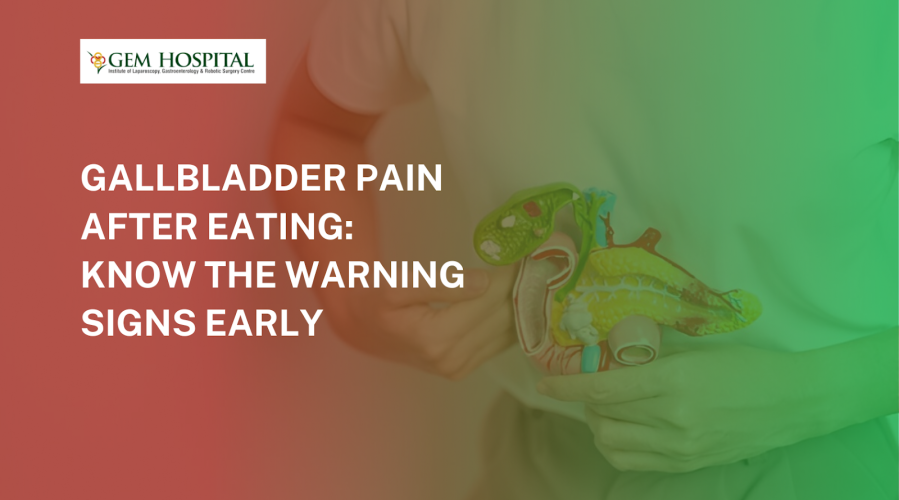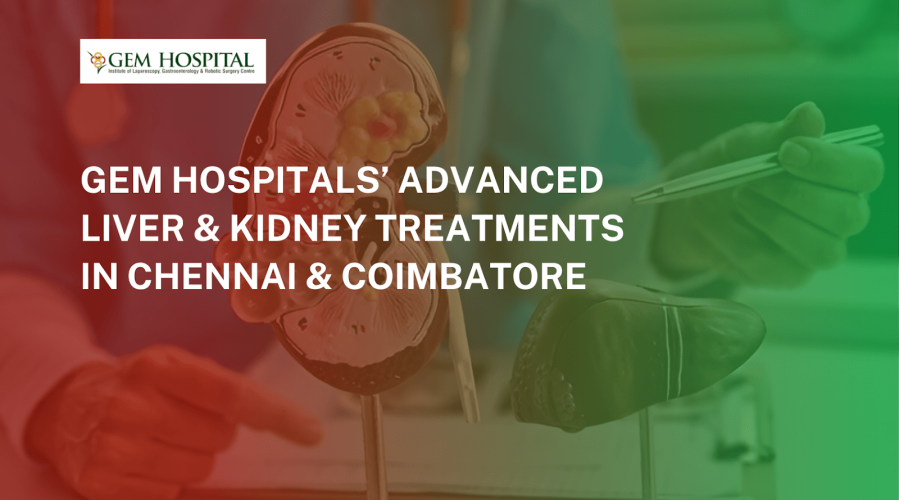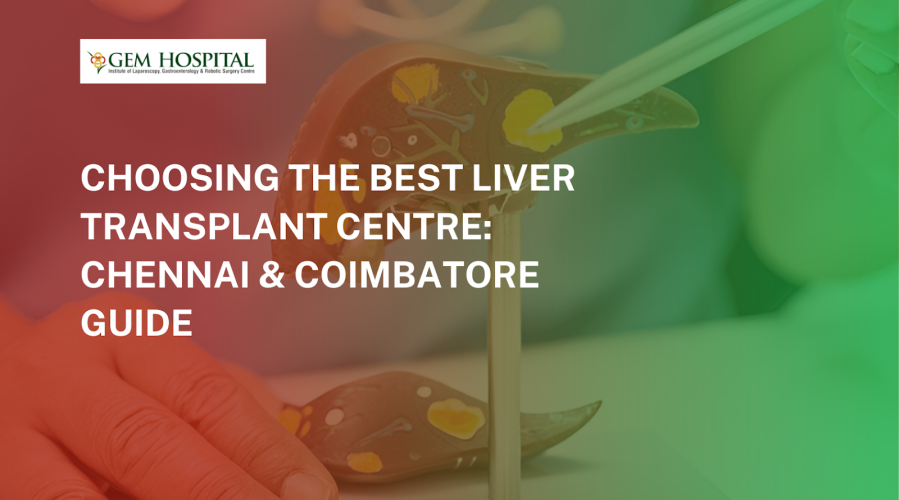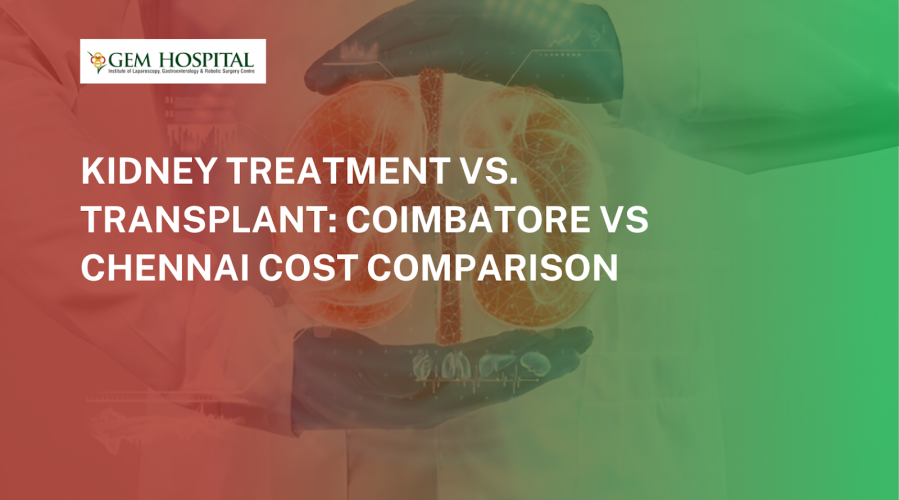Discover the latest advances in liver and kidney treatment at GEM Hospitals in Chennai and Coimbatore. Learn how our cutting-edge care and expert specialists set us apart from other healthcare providers.
Gallbladder Attacks After Meals? What You Need to Know Before It Gets Worse

Have you ever experienced intense pain in your upper abdomen after a big meal? Especially if it was a rich, oily, or fried meal? If so, you may not just be dealing with indigestion; you may be having a gallbladder attack after eating, which is a situation that you don't want to simply brush off.
Let's unpack what this means, why this happens, what symptoms to look for, and most importantly, when to get help before this turns into serious complications.
What is a Gallbladder Attack After Eating?
A gallbladder attack after eating is an intense, abrupt pain usually felt in the upper right of the abdomen or center of the stomach. This often occurs 30 minutes to 2 hours after eating, and especially after eating a meal high in fat.
Gallstones! Imagine small chunks of hardened, solidified bile that form in the gallbladder. These stones can block the pathway or flow of bile (the digestive fluid released from the liver, that is stored in the gallbladder) and can cause inflammation and pain. When the bile gets trapped, it allows pressure buildup, and ultimately causes pain in the form of a “gallbladder attack.”
Why Does It Happen After Eating?
The gallbladder’s job is to release bile when you eat particularly fatty foods to aid digestion. But when gallstones are present, this process becomes problematic.
Here’s what happens:
- You eat a high-fat meal.
- The gallbladder contracts to release bile.
- A gallstone blocks the bile duct.
- Bile can't flow freely.
- Pressure builds up, causing pain and a gallbladder attack after eating.
This is why many people report gallbladder symptoms shortly after eating a rich meal.
Common Symptoms of a Gallbladder Attack
Not sure if what you're experiencing is related to your gallbladder? Here are the telltale signs of a gallbladder attack after eating:
- Sudden, intense pain in the upper right abdomen or mid-abdomen
- Pain that radiates to the back or right shoulder
- Nausea or vomiting
- Bloating and gas
- Burping or acid reflux
- Fever and chills (in more severe cases)
- A feeling of fullness even after a small meal
If these symptoms occur repeatedly after meals, it’s time to take it seriously.
High-Risk Foods That Can Trigger Gallbladder Attacks
Certain foods are more likely to provoke a gallbladder attack after eating. These include:
- Fried foods (like samosas, pakoras, French fries)
- Butter, cheese, and ghee-heavy dishes
- Creamy sauces and gravies
- Processed meats (sausages, bacon)
- Baked goods made with refined flour and trans fats
Limiting or avoiding these foods can help reduce your risk but if gallstones are already present, dietary changes alone won’t solve the root problem.
Who Is at Risk of Gallbladder Attacks?
Gallbladder attacks don’t discriminate, but certain factors increase your risk:
- Age over 40
- Being overweight or obese
- Rapid weight loss
- High-fat, low-fiber diet
- Female gender (due to hormonal influence)
- Family history of gallstones
- Diabetes and insulin resistance
If you tick multiple boxes above and have been experiencing discomfort after meals, it’s crucial to get evaluated.
What Happens If You Ignore It?
A single gallbladder attack after eating might seem manageable but repeated episodes can lead to serious complications like:
- Cholecystitis – inflammation of the gallbladder, often requiring surgery
- Pancreatitis – inflammation of the pancreas due to blocked bile flow
- Jaundice – yellowing of the skin and eyes from bile buildup
- Gallbladder rupture – a rare but life-threatening condition
These risks make it essential not to dismiss the symptoms as “just acidity” or “something I ate.”
Diagnosis: How Do Doctors Confirm It’s a Gallbladder Issue?
If you visit a doctor or gastroenterologist, they will typically begin with:
- Ultrasound scan – the most common imaging test to detect gallstones
- Blood tests – to check for infection or signs of bile duct blockage
- CT or MRI – in complicated cases for detailed analysis
At hospitals like GEM Hospital, these tests are conducted efficiently, helping pinpoint the issue with minimal delay.
Treatment Options for Gallbladder Attacks
Once gallstones are confirmed, treatment depends on severity:
- Lifestyle and diet changes – helpful in mild cases
- Medications – to dissolve small cholesterol stones (limited use)
- Laparoscopic Cholecystectomy – the gold-standard surgery to remove the gallbladder
Don’t worry you can live a perfectly healthy life without your gallbladder. In fact, patients who undergo timely removal often experience relief and can resume normal eating within weeks.
Listen to Your Body Before It’s Too Late
If you have had a gallbladder attack after eating, especially if it happened more than once do not ignore it as if it only happened one time. The pain you have endured is your body's way of signaling to you that something is not well and dealing with it now can prevent complications.
Need Expert Help? GEM Hospital is Here for You
GEM Hospital is one of the top centers for advanced laparoscopic and gastrointestinal treatment in all of South India. Our gastro-specialists and gastro-surgeons have helped thousands with gallbladder difficulties with safety and efficiency.
Don't wait until your next painful attack. Contact GEM Hospital and Book your consultation now.
Blogs & Article
Find the best liver transplant centre near you with our comprehensive guide for patients in Chennai and Coimbatore. Learn how to choose a reliable centre for safe and effective treatment.
Compare the cost-effectiveness of kidney treatment versus transplant in Coimbatore and Chennai. Learn which city offers better options for kidney care and transplantation.


